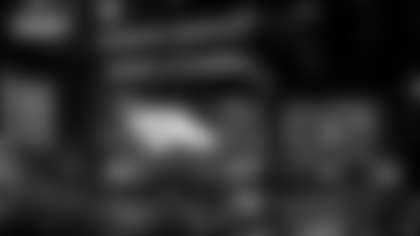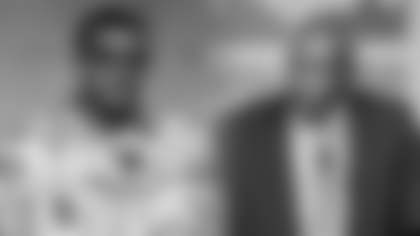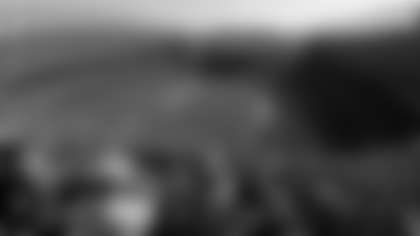Black History Month is a perfect time to look at the beginnings of the Denver Broncos, including one of our Ring of Fame players who was there at the team's formation.
That is Gene Mingo, who, as many of our fans already know, was the first Black placekicker in pro football history and thus was a true pioneer in pro football, as well as for the Broncos.
But well before his Ring of Fame selection, and before all the honors and successes of a long career, there was the beginning. Mingo had grown up on the tough streets of Akron, Ohio, and after leaving high school to join the United States Navy, he honed his skills playing service football.
"Playing in the service, when you go against the Marines, Army or even another Navy team, it was almost like playing against the Raiders or the Chiefs," Mingo told me.
The rosters of service teams at that time in the late 1950s were heavily stocked with former college and even pro players, and the competition was fierce.
"That's where I got most of my experience, playing service ball against Quantico, Camp Lejeune, Fort Belmar, Fort Dix," Mingo said.
When he got out of the Navy just after New Year's Day in 1959 and went to work at the Goodyear rim plant in Akron, he had no way of knowing what the future would hold.
Mingo wrote letters to just about every team, including one to Dean Griffing, general manager of the new American Football League team in Denver. Mingo says Griffing had seen him play in service games and remembered his talent, versatility and speed. He sent Mingo a contract for $6,500.
Mingo remembers the Broncos' first training camp vividly.
"There is no imaginable comparison to be made," Mingo said. "I will always remember the first few days of practice. We were up in Golden at the Colorado School of Mines gymnasium. We had army cots in that gym with about 125 guys in there trying to make the Broncos. And we didn't have much equipment.
"We had one set of dumbbell bars and then [Broncos trainer] Fred Posey would put together buckets of cement and put steel rods through them for us to lift weights. That's what we had. When I tell people that, they don't even understand or believe that. We had one trainer taping all the ankles, trying to take care of everybody. We had one horse trough that was made into a Whirlpool bath."
This was the environment Mingo was trying to climb into from the factories and neighborhoods of Akron, without the benefit of having played in college. And the versatile halfback was also the only Black kicker in football.
"There were a lot of taboos in pro football back in 1960, and it was harder for a Black man," Mingo says.
But before opening day, one of the first road games was a preseason contest against the Dallas Texans in Little Rock, Arkansas. As they got off the bus to go out of the field in Little Rock, some White guys were bluntly rude to the Broncos' Black players.
"They used the N-word, and were pretty rough," Mingo said. "'If you hit one of those white boys, we're going to shoot you, we're going to lynch you.' We played the game without any incidents, but still, something like that never leaves your mind."
Denver finished the preseason schedule 0-5, all on the road, and the Broncos were outscored by a 192-53 margin.
But then came opening day on Sept. 9, 1960, and the Broncos played the AFL's first game against the Boston Patriots.
"Nobody could have touched me on Sept. 9, 1960 when we played Boston," Mingo said. "Here's a kid who did not even graduate high school and now he's starting a pro career and nobody really expected him to have, let alone score the winning touchdown on a punt return. That can never be broken."
That first game in AFL history was played at Boston University Field on a warm September night with 21,597 mostly curious spectators. The Patriots had the benefit of playing in a college setting with full-time groundskeepers.
"It was the best field I had ever played on," Mingo said. "It was like walking on a carpet, but softer. It was so well groomed.
"We had those vertical socks on, and when we went out onto the field for warmups the crowd just went wild. They started to laugh at us and call us clowns."
But the first game was going into the books, and the first halftime in AFL history showed the Broncos with a 7-3 advantage.
At the end of the first half, head coach Frank Filchock approached Mingo because the team's primary returners had been injured. "Mingo, you're running back punts and kickoffs," Filchock said.
Mingo was not expecting that. "I was so nervous and scared," he remembers.
In the locker room at halftime, Jim Greer, one of the Denver receivers, reached over and said, "Hey, man, don't be nervous. Just do it like you do in practice. Catch the ball and run."
Other Black players lent their support as well. Mingo remembers it well. "The Black players came over to me and gave me some encouragement. I was scared, but I was excited, too."
Late in the third quarter, the Patriots were forced to punt. They punted into history.
Mingo caught it at the Denver 24 and took off.
"I can still see it now," Mingo said. "I made like I was making a move to my left, then back to my right. I picked up my blockers and just ran down the sideline. When I got there, I was so tired that I could not kick the extra point, and kicked a big divot out of the ground.
"When Frank Filchock told me at halftime that I was going to be running back kicks, I was scared. But when I caught that punt, and was going down our sideline and I could see Filchock and some of the guys waving me on, that was one of the best feelings ever. There's no way to describe it. To get down there and not knowing at the time that it was going to be the winning points, it was just wonderful."
In fact, the 76-yard punt return touchdown, the first in AFL history, held up and was the winning score in the first-ever game played by two franchises that both would go on to Super Bowl immortality decades later.
And it was just the first game in what would become a decade-long pro football career that made history, for Mingo stands alone as the first Black placekicker in pro football.
For Gene Mingo on that perfect New England night in September, the streets of Akron were far away and that moment in time would live on forever for a future Bronco legend.
Next week: The story of Gene Mingo continues…















